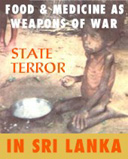|
"To us
all towns are one, all men our kin. |
| Home | Whats New | Trans State Nation | One World | Unfolding Consciousness | Comments | Search |
|
"To us
all towns are one, all men our kin. |
| Home | Whats New | Trans State Nation | One World | Unfolding Consciousness | Comments | Search |
Sri Lanka's Genocidal War - '95 to '01
"the intentional withholding of medicine and medical supplies from LTTE controlled areas is a clear violation of common Article 3 and is a war crime." Professor Jordan J. Paust

According to reports, between January and August this year, 32 children died in the Kilinochchi hospital. In late September, a month-old Mayuri died of diarrhoea in Akkarayan hospital. Local people say lives could be saved if adequate medicines and medical equipment are available.
A large part of the Vanni region is controlled by the Liberation Tigers of Tamil Eelam (LTTE) who are fighting a 17-year war to establish a separate state or Tamil Eelam for the minority Tamil community in the north-east.
The Sri Lankan government has imposed restrictions on food, medicines, fuel and other essential needs into the Vanni. The economic embargo under Emergency regulations is in force since August 1991.
International agencies continue to protest, as the restrictions have little effect on the Tigers but adversely affect the health sector and undermine the local economy.
The World Bank says that health services have deteriorated in the conflict areas, border villages and welfare camps and identifies three health risks:
"The first is the rise of the most virulent form of malaria due to the absence of proper control activities. Respiratory infections and water borne diseases are also on the rise due to inadequate shelter, damage to sewage systems and unsanitary conditions in welfare camps. "The second is the worsening in maternal and child health, especially the nutritional status of children, due to food shortages and the deterioration of health services. The third and most challenging concern relates to the psychological trauma associated with the conflict, displacement and disintegration of community and family structures".
At Vavuniya in early September, the military appropriated medicines and medical equipment earmarked for Mullaitivuís Mallavi hospital. The medicines and equipment were taken to the Army hospital and desperate attempts by local government health authorities to retrieve them failed.
People injured in the war are unable to procure rehabilitative materials. The Army continues to prevent raw materials needed to manufacture artificial limbs, which is affecting hundreds of people who have lost limbs in landmine explosions. There are only a few ambulances for transport of seriously ill patients to Anuradhapura or Vavuniya hospitals where more facilities are available.
Three ambulances provided by international agencies for the Vanni region are still being held by the Army in Vavuniya.
According to the Health Department, 17% of the children born in the hospital at Puthukudyiruppu in August were malnourished and under-weight. Reports say that the government has not released Rs 800,000 ($10,250) allocated in January this year for nutritional programmes in Mullaitivu District.
NGOs say the military has refused permission to supply dry rations to 120,000 of the 374,000 people who need humanitarian assistance in the Vanni.
As a result of the restrictions, prices of essential commodities remain high in the area. A litre of kerosene (paraffin) was sold at Rs 250 ($2.5) in September.
As fighting continues in Jaffna, more than 90,000 people displaced from southern Thenmaratchy and south-eastern Pachchilaipalli areas are unable to return home. A further 65,000 are said to have fled their homes following Armyís Operation Kiniheera (Anvil) launched on 17 September.
NGOs have expressed concern for the 17,000 people in 136 government refugee camps which lack water and sanitary facilities. There is fear that diseases may spread in the camps. The refugees are affected by the current rains and say that temporary shelters built in Valikamam and Vadamaratchy by NGOs are inadequate.
The BBC says that in a recent survey, French medical agency Medecins Sans Frontieres (MSF) concluded that around 20% of the displaced people in Jaffna are suffering from acute malnutrition. This figure rises to more than 30% among displaced children aged between six months and 17 months.
The Army banned fishing in Jaffna lagoon on 3 September as it launched Operation Rivi Kirana (Sunbeam) to capture LTTE-controlled areas east of Jaffna town. The ban was removed on 13 September, but re-introduced on 20 September after five men who went fishing failed to return. The Army suspect that the fishermen have gone into Tiger-held territory.
Punishing the entire fishing community for such incidents has become the norm in Jaffna, crippling the fishing industry and throwing the fisher families into extreme poverty."